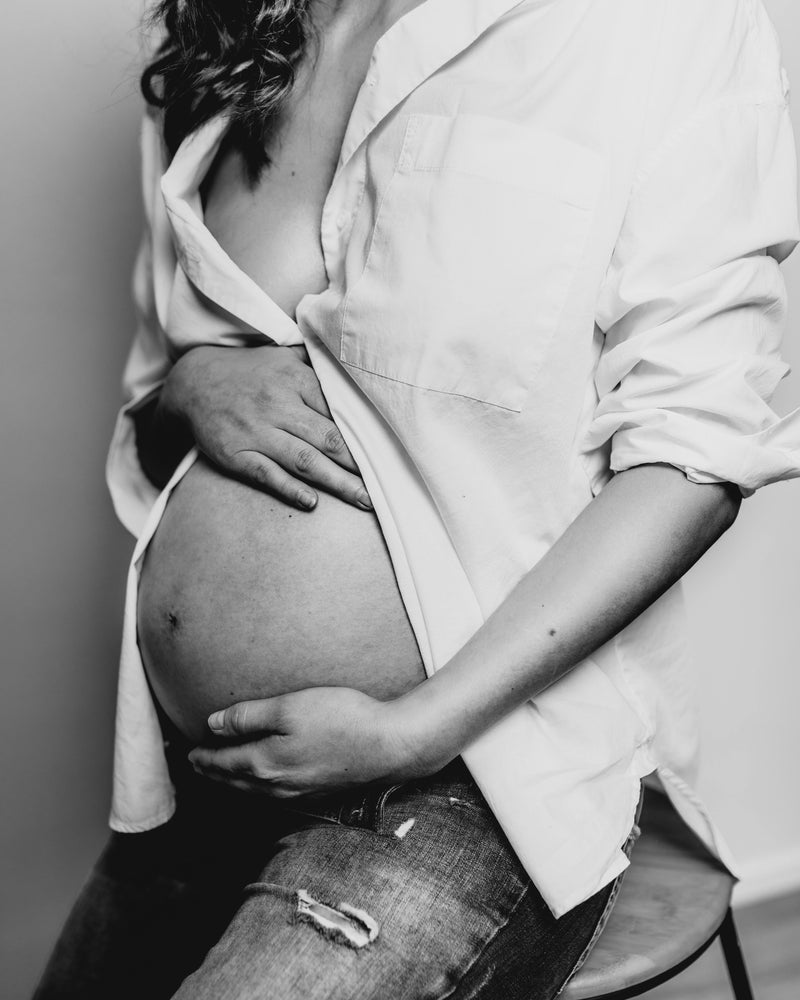The hair loss that many women experience after pregnancy, technically called postpartum telogen effluvium, is unwelcome, unpleasant, and often unexpected. While it’s unavoidable, it’s also normal. Dermatologists refer to this condition as excessive hair shedding—it’s not true hair loss, and it’s not permanent. According to the American Academy of Dermatology, most women will see hair return to its normal fullness within twelve months after birth.
First, a primer on the normal cycle of hair growth: Hair on the scalp grows about .4 mm every day or about six inches per year. The three stages of growth and shedding are the anagen (growth) phase, the catagen (transitional) phase, and the telogen (resting) phase. At any given time, about 90 percent of hair on the scalp is in anagen phase, 3 percent is in the catagen phase, and 7 percent is in the telogen phase. Hair in the telogen phase sheds, which is normal, and on average most people shed about 100 hairs a day.
We asked Karyn Grossman, a board-certified dermatologist in Santa Monica, how the hair growth cycle is affected by pregnancy and childbirth—and what can be done about it.
What is postpartum telogen effluvium?
During pregnancy, more hair follicles remain in the anagen phase for a longer period. “The shift of hormones at birth pushes those growing hairs into the resting phase,” explains Grossman. This signals them to stop growing and, a few months later, fall out—usually at the same time. This is a development called postpartum telogen effluvium (postpartum TE), a molt-like shedding that takes place two to four months after delivery. “It is typically seen as hair coming out in your brush, on your pillow, in the shower, and occasionally on your clothes as well,” says Grossman. It is diffuse shedding (meaning hair falls out from all over your head), and the median amount of hair shed from postpartum TE is about 300 hairs a day.
How common is postpartum telogen effluvium?
According to the American Pregnancy Association, postpartum TE occurs in 40 to 50 percent of new mothers.
What causes it?
After you have a baby, estrogen levels drop, and hair falls out.
Iron deficiency and stress can also contribute to excessive shedding. (Technically, it’s considered excessive shedding, not hair loss, because the hair comes back.) In an article in the journal Clinical, Cosmetic and Investigational Dermatology, researchers noted that you’re more likely to get it after your first pregnancy than subsequent pregnancies, and getting it once doesn’t necessarily mean you will get it again. Researchers theorize that one of the reasons it’s more common after first deliveries is possibly “in relationship with the emotional strain of delivery, which is maximum at the first delivery.”
How can I prevent it?
“Unfortunately, this is a natural and common occurrence for many new moms, and there is nothing that you can do to prevent this from happening or to stop the shedding sooner,” says Grossman. However, you can boost your natural growth and help the hair to grow back more quickly.
What can I do about it?
What you want to do is prime the scalp for natural and healthy growth after shedding occurs, which for most women occurs around three months postpartum. Some people believe that volumizing shampoos will thicken hair and conditioning shampoos will weigh hair down and make it look thinner, so consider trying new shampoos and conditioners. In addition, there are some supplements and topical solutions that aim to stimulate and nourish the scalp and may support your natural growth.
ANYA Scalp Serum
Anya scalp serum is formulated to nourish and stimulate the scalp to support healthy hair growth. The plant-based formula is safe for use when breastfeeding and can be applied daily to wet or dry hair without making the hair feel greasy or weighed down. Anya serum uses a combination of clinically tested organic pea sprouts, shown to help stimulate the scalp and encourage hair growth after shedding, along with other botanicals to nourish the scalp leading to fuller, thicker hair.
ANYA Postnatal Multivitamin + Omega-3
Our postnatal vitamin builds on that in the postpartum period. It is formulated to support the additional nutritional demands of women after childbirth. In addition to supporting energy levels, cognitive health, and breastmilk production, it also includes vitamins A, B (B12, biotin), D, and E, as well as zinc—all crucial to support a healthy scalp and hair growth.
Collagen supplements
Consuming collagen and other protein helps your body provide the amino acids that make hair. “Women who are vegan may have a harder time getting in enough protein, so adding collagen supplements to a smoothie or drink is very useful,” says Grossman. “Even women who eat meat and eggs may find that adding a collagen supplement helps to support hair growth.” Always consult your health care provider before taking supplements.
KeraFactor Scalp Stimulating Solution
“This is a topical growth factor solution that helps to stimulate hair growth in the scalp,” says Grossman. It works by delivering growth factors and proteins that improve scalp circulation and give hair follicles the nutrition they need to produce thick, healthy hair. “It’s easy to use and doesn’t leave a film on the hair or scalp.” But it comes with a big asterisk: This should not be used if you are pregnant or breastfeeding, and be sure to consult your health care provider before any new treatment.
How long will postpartum TE last?
Postpartum TE usually begins about two to four months after childbirth and typically lasts for two to three months, usually followed by full recovery. “If the shedding goes beyond four months, you should see your dermatologist to make sure everything else in your body is functioning well,” says Grossman, noting that low iron, a thyroid imbalance, or other medical issues may also cause hair loss.
“Most of the time, all of the hair will eventually regrow,” says Grossman. But it takes time. Since hair growth is a very slow process—remember that a hair typically grows about half an inch per month—it can take up to a year for hair to get back to baseline. Tempting as it may be, “avoid extensions because they can cause breakage, which will not help in the long term,” says Grossman.
Dr. Karyn Grossman is an adviser to Anya.






